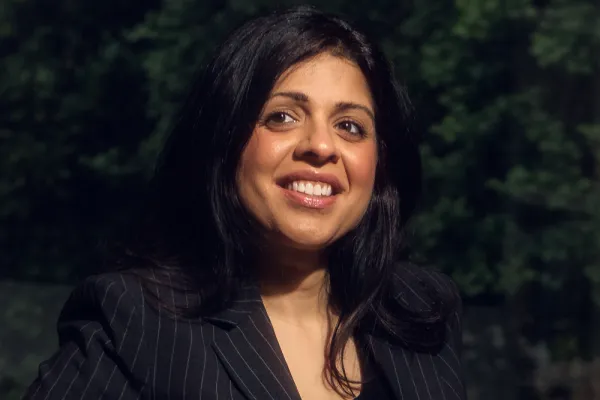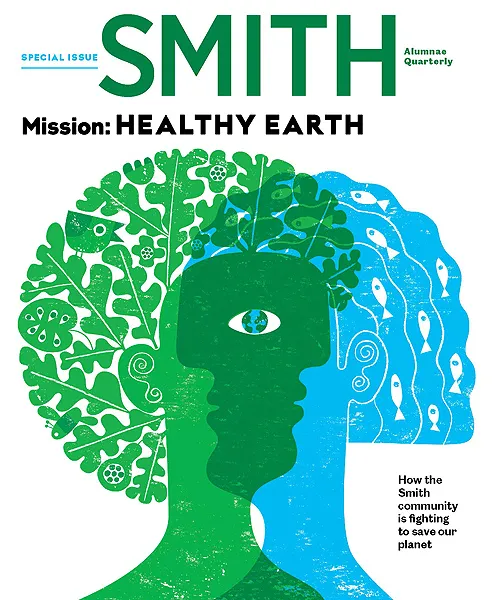Her Climate Superpower? Optimism
Alum News

Published March 18, 2020
Shazia Khan ’98 wants more.
More media coverage of existing solutions to climate change. More investment dollars devoted to using technologies that capture and store carbon. More minds focused on solving the problem, which she has no doubt can be solved. More countries—developed and developing—committed to immediately reducing their carbon emissions.
That same list extends to expanding her company, EcoEnergy, to ensure that rural communities around the world have greater access to clean sources of energy. Founded more than 10 years ago, EcoEnergy provides affordable solar power to people in rural Pakistan who don’t have enough electricity or who live completely off the grid.
“The goal is not just to give somebody one light,” Khan says. “The goal is to move them to a place where they can have access to lots of different applications through their electricity.”
Khan, an environmental lawyer who also worked as a consultant on energy issues at the World Bank, began developing the idea for EcoEnergy after completing a fellowship in 2007 at Grameen Shakti, a nonprofit that provides low-cost solar home systems to people in rural Bangladesh. From that experience, she learned that there are two major solutions to climate change. “First, we need to clean up the mess that’s already here by capturing and storing all carbon that exists in the air. And we have the technology to do that,” she says. “Second, we need to make sure that in the future, nobody else is putting more junk into the atmosphere.”
Her goal, she says, is to get Pakistan to net zero—powered solely by renewable energy—and to establish this as a model for moving every country to net zero.
Enter EcoEnergy. Launched in 2009, the company not only meets the needs of off-grid and underelectrified communities, it also equips them with clean energy technology before they burn wood or use resources like kerosene and diesel-powered generators that pollute the air.
Pakistan was the perfect place for EcoEnergy to test its business model. It is the fifth most densely populated country in the world and, according to Khan, it is predicted to increase carbon emissions by 300 percent in the next 15 years. Out of a population of 210 million people, 65 million Pakistanis don’t have electricity, and 71 million more are underelectrified. Within these statistics, Khan saw an opportunity. “There are more people who have cellphones in this world than who have toothbrushes,” she says. “People will adopt the technology as long as it’s affordable and offers them a compelling value proposition.”
To test her hypothesis, Khan surveyed 44,000 households about their energy needs. Based on the results, she decided that EcoEnergy would start small, supplying customers with $10 solar lanterns that emit light after being charged. The company quickly sold 15,000 lanterns. Over time, Khan found that customers wanted more than lanterns they had to carry around. They wanted an electricity service to light multiple rooms, power fans and televisions, and charge phones.
That’s when she and her business partner, Jeremy Higgs, brought solar home systems to Pakistan. The system serves as a generator, getting its main fuel from the sun. The larger the solar panel that goes along with each control unit, the more power available for things like appliances. To make the system economical, Khan implemented a monthly payment approach that allows customers to either rent or lease to own. She also offers a pay-as-you-go plan. When a customer makes a payment, EcoEnergy can unlock a corresponding amount of electricity to the customer’s home device, as well as turn it on or off remotely. Eighty-five percent of the company’s first 200 customers repaid their systems in about a year and a half.
In just one year, EcoEnergy amassed 8,000 customers. The company currently has about 10,000 customers, and Khan projects that by the end of 2020 it will have 40,000. Her goal, she says, is to get Pakistan to net zero—powered solely by renewable energy—and to establish this as a model for moving every country to net zero.
Khan’s own concern for the environment developed at an early age. Throughout her childhood, Khan and her Pakistani American family would often visit Pakistan.
The air pollution, flooding and deforestation there stood in stark contrast to the environment of her hometown of Albany, New York. In high school and college, Khan’s resolve to make sure we all have a future deepened as she watched governments and communities come together to fight the ozone layer crisis. “We solved the ozone problem within a generation, while I was at Smith,” Khan says. “I feel like [climate change] is also a very solvable problem.”
To that end, she has set her sights on extending EcoEnergy’s reach beyond the borders of Pakistan; her next target is Southeast Asia. “I’m not interested in reaching 30 percent of the population,” Khan says. “If I’m fighting climate change, I need to reach 100 percent of the population. It’s only going to matter if every single country decides they’re going to drastically reduce their emissions.”
This is the legacy she wants to leave her children: “I want to look back 20 or 40 years from now and say, ‘Yup, there was a problem called climate change and I helped solve it. I didn’t cry about it. I figured out the solution and I executed it. And I galvanized everybody around me and we all did it together.’”
This story appears in the Spring 2020 issue of the Smith Alumnae Quarterly.
SMITH ALUMNAE QUARTERLY
Special Climate Issue

Mission: HEALTHY EARTH
How the Smith community is fighting to save our planet
SMITH ID
SHAZIA KHAN ’98 Co-founder and executive director, EcoEnergy
MAJOR: Government
FURTHER EDUCATION: J.D., Vermont Law School’s environmental law program
Photograph by Jared Soares